OK, here’s my brilliant idea for the next big thing: novelty festivals. A summertime event where accordion players, toy-instrument bands, zoot-suited swingers, Mexican-wrestling-mask-adorned rockers and sideshow acts of all shapes and sizes can have their day. You know, in the sun and all. And all the porkpie-hat-wearing, crinoline-skirt-twirling, hula-hooping, combat-boot- and striped-knee-sock-sporting fans can jive, boogie, jitterbug, swing and pogo dance their way to their particular bent of quirky ecstasy.
Just one little caveat before we print up T-shirts for Novelty Fest 2006: If you gather a whole bunch of oddity acts together, at some point, doesn’t weird just become the norm?
Not according to Jason Trachtenburg of the Trachtenburg Family Slideshow Players. As the patriarch puts it: “The more avant-garde, then the better the show.”
That is, as long as the songs themselves are “sensibly melodic, lyrically relevant, socially significant, and intriguingly innovative,” he went on to explain during a recent interview with Xpress.
“Should the finished presentation be comical and artistically groundbreaking, then that’s entertainment.”
What it is and where it came from
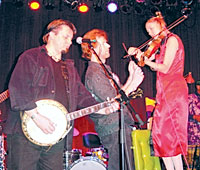
Curing the squares: Snake Oil Medicine Show shared the road with plenty of other “doctors.”
|
If it seems like novelty — at least the local breed — started a decade ago with the advent of neo-vaudevillians Snake Oil Medicine Show and their folky, twangy, psychedelic-lite, arty stage mayhem, well … not quite. Medicine shows hearken back more than a century to the days of traveling horse-and-buggy “doctors” who sold promised miracle cures and true-love tonics between variety acts designed to gather crowds. Snake Oil shares its historical namesake with plenty of other latter-day charlatans, including has-been pop-country band Dr. Hook & the Medicine Show and current old-time hipster darlings Old Crow Medicine Show.
But those first back-road placebo peddlers weren’t exactly traveling the novelty circuit alone: magic acts, animal trainers, storytellers and disfigured unfortunates displaying their various birth defects were all common incarnations of entertainment. That was long before big stadiums, the wall of sound and ’80s hair bands in circulation-disabling jeans became the norm. It’s worth noting that those same hair bands have already become fodder for various novelty-flavored “tribute” bands.
Today’s hipper novelty acts, however, draw inspiration from the stars of the vaudeville era (think the Original Creole Orchestra, Ukulele Ike and Judy Garland as part of the singing Gumm Sisters) and from burlesque — smut-free vaudeville’s spicier counterpart. Heavily dependent on parody, burlesque, according to wikipedia.com, spawned the exotica and lounge-music revival of the 1990s, as well as this decade’s New Burlesque, personified in Asheville’s own beloved, if apparently short-lived, Rebelles.
Austin, Texas, took the whole novelty revival more seriously than probably any other city, starting with the post-new wave New Sincerity movement of the 1980s. “Austin’s parody history glories in such acts, from Balcones Fault and Kinky Friedman to Not Daniel Johnston, the Wannabes and Glamourpuss,” reported the Austin Chronicle in 2004. Today, the city’s novelty contingent includes naughty nostalgia group Asylum Street Spankers, kilt-wearers the Brobdingnagian Bards and pop-music skewers the Uranium Savages, who’ve been on the scene for 30 years.
It’s a pirate thing (you wouldn’t understand)
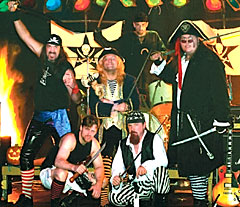
Wonder how much booty they get?: The Jolly Garogers don’t break out of their pirate schtick. Ever.
|
Which brings us to Austin’s Jolly Garogers — a group that casts itself rather in the mold of other minority artists, preferring to be called a pirate band, period, rather than a new fragment of novelty entertainment. Unlike the better-known Asheville novelty acts — postmodern parlor group Mad Tea Party or high-energy old-time artists the Rib Tips — the Jolly Garogers have nothing to do with early-20th-century revival. Rather, their schtick, from the pirate gear they wear on stage to their assumed names and the “Aargh, matey” lingo, is total Captain Hook.
“I see no connection between [novelty meaning ‘new’] and using stage props, costumes, etc. to cover up a musical lack of talent or a lazy work ethic in practicing. I suppose you could try that, but people will see right through it,” Captain Phleabag asserts via e-mail. “There is no substitute for great songs, and great stage performance. You can only achieve these goals with hard work and practice.” He goes on to list famed bands like KISS and Devo and artists like Alice Cooper and even U2’s Bono as acts who’ve used stage personae to their benefit.
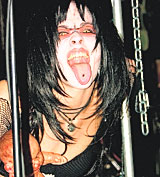
Scaring up success: Monsters of Japan know that demonic makeup and bloody baby dolls can work more magic than a well-meaning publicist.
|
For some reason, though, KISS is considered something of a rock legend, while Asheville’s makeup-splattered, chainsaw-wielding schlock rockers Monsters of Japan are stuck wearing the novelty collar (not that the S&M-inclined band seems to mind).
“Bands today have lost the whole mentality of showmanship,” Monsters front man Roast complained to Xpress earlier this year.
Even Snake Oil Medicine Show, whose members neither spurt fake blood nor bludgeon baby dolls, sees the benefit in taking showmanship to its edge. “I’m a thespian — I say go for it,” asserts bandleader George Pond. His crew often travels with artist Phil Cheney, who creates his psychedelic, cartoonish paintings on stage to the beat of the band’s acoustic vaudeville strumming. “[We’ve] been called over-the-top by some people,” Pond boasts. “I support dramatic expression.”
What would Django say?
Then there are the groups for whom dramatic expression doesn’t require a full-time painter — just an affection for Eastern Bloc eccentricity. NYC-based gypsy-punk outfit Gogol Bordello has upped the ante of the violin- and accordion-based band. As if freaking out new audiences with archaic instruments isn’t enough, Ukrainian-expat front man Eugene Hutz channels Iggy Pop, orchestrates a stage show with “Gogol dancers” dressed like border cops who bind him with his microphone cord, and imbibes copious amounts of booze. “We’re not allowed to play in CBGB, Brownies [or] Mercury Lounge,” Hutz bragged to the Village Voice in 2002. “They don’t want to deal with that level of excitement.”
Banned from CBGB — the bar that hosted the New York Dolls and the Sex Pistols in the ’70s.
Other, tamer gypsy-punk outfits have cropped up like so many colorful mushrooms — including the Luminescent Orchestrii, Royal Pine, Mikelangelo and the Black Sea Gentlemen, Waiting for Guinness, Doch, and, not least, the Hellblinki Sextet, a self-described “gypsy pirate blues group” that recently relocated here. The traveling Circus Street Orchestra could recently be heard carnival-barking and squeeze-boxing away an afternoon at the tourist-heavy junction of Wall Street and Battery. Other reimagined ethnic folk groups include the Klezmatics and Josh Lederman y Los Diablos, who proudly rock their Jewish roots (the latter band’s Latin name only adds to the artful ambiguity, of course). But New Orleans’ Zydepunks — half of whom are holed up in Asheville since Katrina — may take the multicultural prize: They’re billed as the Big Easy’s “favorite Cajun Irish Breton French Klezmer Slavic Zydeco Punk band.”
Which begs the question: Is the world-infused folk resurgence an ever-expanding — or, rather, a rapidly shrinking — market? As up-and-comers like the Warsaw Village Band — a hipster old-time Polish group who really are from Poland — gain a foothold with Western audiences, old-world wannabes may lose some of their exotic luster.
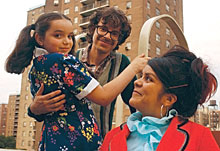
Picture this: The Trachtenburg Family Slideshow Players are perhaps the most truly novel act on the weird-folk circuit.
|
But ethnicity has nothing to do with the determined unorthodoxy of the Trachtenburg Family Slideshow Players. “We are an indie-vaudeville conceptual art-rock pop band,” explains papa Trachtenburg. “We are entering the golden age of mixed media. I say this because what else is there left to do but combine elements of our overwhelming culture and then turn those elements into art?”
The Slideshow Players are a family band in the truest sense. Trachtenburg’s 12-year-old daughter, Rachel, plays drums and sings backup and his wife, Tina, mans the slide projector. The band’s songs relate to found images — often the vacation slides of strangers culled from yard sales. “Our band is a natural extension of our family lifestyle,” Trachtenburg explains.
But for the Slideshow Players, being an anomaly isn’t sufficient: This group lives to get laughs. “As a concept, we are staying true to our original premise of turning the lives of anonymous deceased strangers into pop-rock music exposes based on the contents of their found slide collections,” the songwriter philosophizes via e-mail. “We must go by the presumption that audiences are paying big bucks [for] the ultimate reward of having their expectations challenged and their points of reference forever altered.”
He continues: “We are contractually obligated to … acknowledge the entire audience to the fullest, bring entertainment back to entertainment and to do song introductions that are always longer than the proper songs themselves.”
Day jobs are obviously not an option.
Folk: reinvented (again)
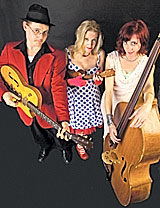
The right brew: Mad Tea Party tempers its quirk with well-written songs and a pleasing self-deprecation.
|
And this kind of skewed sense of purpose is echoed throughout the motley genre that is novelty. From all-female ukulele swingers to shock-rockers to little Big Bands, avant-garde musicians are out to prove it takes talent to be long-term quirky.
“We can’t book ourselves as a singer/songwriter act or [as] a preservationist act, either,” Mad Tea Party ukulele player Ami Worthen admitted to Xpress in 2003. She went on: “I have a lot of respect for people who are preservationists, but I am part of keeping folk music alive in terms of creating new songs and new sounds.”
The group, which currently consists of Worthen, multi-instrumentalist Jason Krekel and standup bassist Lora Pendleton, bases its sound on vintage jazz and ragtime. But other influences peep through — strains of rueful, apologetic geek rock carried through Worthen’s breezy original tunes. And then there’s the songstress’ commitment to reinstating the uke as a viable stage-worthy instrument.
Sure, Mad Tea Party studies the old-school 78s, but according to Worthen, “my particular role is in reinventing folk music, and less in trying to preserve what was done before.”



Before you comment
The comments section is here to provide a platform for civil dialogue on the issues we face together as a local community. Xpress is committed to offering this platform for all voices, but when the tone of the discussion gets nasty or strays off topic, we believe many people choose not to participate. Xpress editors are determined to moderate comments to ensure a constructive interchange is maintained. All comments judged not to be in keeping with the spirit of civil discourse will be removed and repeat violators will be banned. See here for our terms of service. Thank you for being part of this effort to promote respectful discussion.